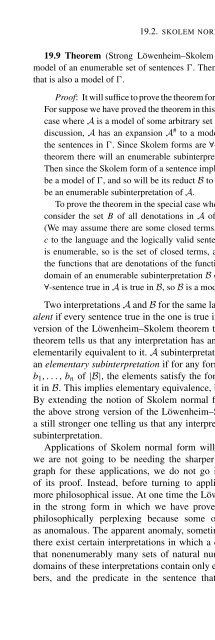Computability and Logic
Computability and Logic
Computability and Logic
Create successful ePaper yourself
Turn your PDF publications into a flip-book with our unique Google optimized e-Paper software.
19.2. SKOLEM NORMAL FORM 251<br />
19.9 Theorem (Strong Löwenheim–Skolem theorem). Let A be a nonenumerable<br />
model of an enumerable set of sentences Ɣ. Then A has an enumerable subinterpretation<br />
that is also a model of Ɣ.<br />
Proof: It will suffice to prove the theorem for the special case of sets of ∀-sentences.<br />
For suppose we have proved the theorem in this special case, <strong>and</strong> consider the general<br />
case where A is a model of some arbitrary set of sentences Ɣ. Then as in our earlier<br />
discussion, A has an expansion A # to a model of Ɣ # , the set of Skolem forms of<br />
the sentences in Ɣ. Since Skolem forms are ∀-sentences, by the special case of the<br />
theorem there will an enumerable subinterpretation B # that is also a model of Ɣ # .<br />
Then since the Skolem form of a sentence implies the original sentence, B # will also<br />
be a model of Ɣ, <strong>and</strong> so will be its reduct B to the original language. But this B will<br />
be an enumerable subinterpretation of A.<br />
To prove the theorem in the special case where all sentences in Ɣ are ∀-sentences,<br />
consider the set B of all denotations in A of closed terms of the language of Ɣ.<br />
(We may assume there are some closed terms, since if not, we may add a constant<br />
c to the language <strong>and</strong> the logically valid sentence c = c to Ɣ.) Since that language<br />
is enumerable, so is the set of closed terms, <strong>and</strong> so is B. Since B is closed under<br />
the functions that are denotations of the function symbols of the language, it is the<br />
domain of an enumerable subinterpretation B of A. And by Proposition 19.7, every<br />
∀-sentence true in A is true in B,soB is a model of Ɣ.<br />
Two interpretations A <strong>and</strong> B for the same language are called elementarily equivalent<br />
if every sentence true in the one is true in the other. Taking for Ɣ in the above<br />
version of the Löwenheim–Skolem theorem the set of all sentences true in A, the<br />
theorem tells us that any interpretation has an enumerable subinterpretation that is<br />
elementarily equivalent to it. A subinterpretation B of an interpretation A is called<br />
an elementary subinterpretation if for any formula F(x 1 , ..., x n ) <strong>and</strong> any elements<br />
b 1 , ..., b n of |B|, the elements satisfy the formula in A if <strong>and</strong> only if they satisfy<br />
it in B. This implies elementary equivalence, but is in general a stronger condition.<br />
By extending the notion of Skolem normal form to formulas with free variables,<br />
the above strong version of the Löwenheim–Skolem theorem can be sharpened to<br />
a still stronger one telling us that any interpretation has an enumerable elementary<br />
subinterpretation.<br />
Applications of Skolem normal form will be given in the next section. Since<br />
we are not going to be needing the sharper result stated in the preceding paragraph<br />
for these applications, we do not go into the (tedious but routine) details<br />
of its proof. Instead, before turning to applications we wish to discuss another,<br />
more philosophical issue. At one time the Löwenheim–Skolem theorem (especially<br />
in the strong form in which we have proved it in this section) was considered<br />
philosophically perplexing because some of its consequences were perceived<br />
as anomalous. The apparent anomaly, sometime called ‘Skolem’s paradox’, is that<br />
there exist certain interpretations in which a certain sentence, which seems to say<br />
that nonenumerably many sets of natural numbers exist, is true, even though the<br />
domains of these interpretations contain only enumerably many sets of natural numbers,<br />
<strong>and</strong> the predicate in the sentence that we would be inclined to translate


